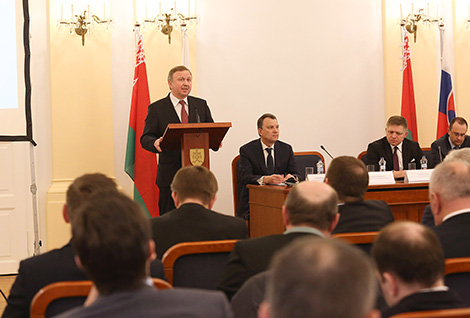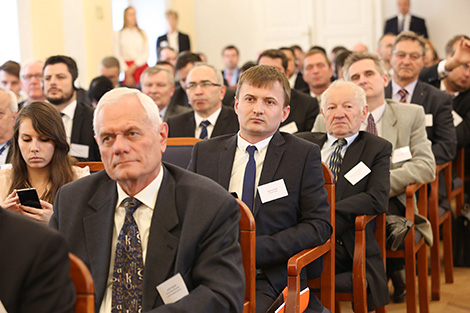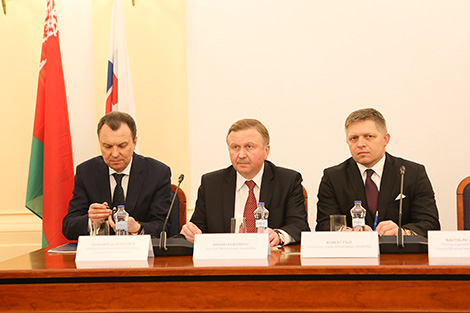Business news
Slovakian companies invited to set up enterprises in China-Belarus industrial park Great Stone

BRATISLAVA, 27 April (BelTA) – Belarus would like Slovakian businessmen to set up enterprises in the China-Belarus industrial park Great Stone and invest in Belarus’ Hi-Tech Park, BelTA learned from Prime Minister of Belarus Andrei Kobyakov during the Belarusian-Slovakian business forum on 27 April.
Andrei Kobyakov pointed out that a number of preferential terms are available to foreign investors, who are intent on doing business in Belarusian free economic zones, the Hi-Tech Park, and the industrial park Great Stone.
 Andrei Kobyakov remarked that Belarus is interested in expanding investment cooperation with Slovakia. Yet as of 1 January 2017 the total volume of Slovakian investments in the Belarusian economy was only $4.2 million. In 2016 the inflow of direct investments slightly exceeded $700,000. “We understand that these days free capital is in demand in Slovakia, too. However, we would like you to once again look at Belarus’ investment advantages, primarily in view of Belarus’ membership in the Eurasian Economic Union,” noted the prime minister. Belarus is the westernmost part of the Eurasian Economic Union in geographical terms. Belarus also has a lengthy border with the European Union, well-developed infrastructure, highly qualified workforce, and represents an ideal springboard for penetrating the Eurasian Economic Union market, Andrei Kobyakov believes.
Andrei Kobyakov remarked that Belarus is interested in expanding investment cooperation with Slovakia. Yet as of 1 January 2017 the total volume of Slovakian investments in the Belarusian economy was only $4.2 million. In 2016 the inflow of direct investments slightly exceeded $700,000. “We understand that these days free capital is in demand in Slovakia, too. However, we would like you to once again look at Belarus’ investment advantages, primarily in view of Belarus’ membership in the Eurasian Economic Union,” noted the prime minister. Belarus is the westernmost part of the Eurasian Economic Union in geographical terms. Belarus also has a lengthy border with the European Union, well-developed infrastructure, highly qualified workforce, and represents an ideal springboard for penetrating the Eurasian Economic Union market, Andrei Kobyakov believes.

The prime minister noted that constructive business contacts had evolved between Belarusian and Slovakian banks. The contacts allow them to work together to finance and insure Slovakian exports to Belarus and Belarusian exports to Slovakia. “We believe it would be a good idea to work together on further increasing the appeal of financial instruments for Belarusian and Slovakian businesses,” suggested Andrei Kobyakov. It would allow reducing risks of mutual defaults on payments in addition to enabling the best possible terms for product promotion.

Andrei Kobyakov stated that in the last few years the state of affairs in the European region and the Eurasian region underwent considerable changes, which could not but affect the state of Belarus-Slovakia trade. In 2016 the bilateral trade dropped to $162 million. “There is no doubt that changes of demand and supply due to competition changes on the global market are the main reasons for such a state of affairs. The open and export-oriented nature of the Belarusian and Slovakian economies makes us dependent on global economic and political processes,” remarked Andrei Kobyakov. “In these conditions efforts of Belarusian and Slovakian commercial entities to advance cooperation, their determination to find new forms of interaction are vital for future success. Both sides should prioritize long-term ties that allow building a long-term cooperation strategy instead of transitory benefits.”







 print version
print version make home page
make home page add to bookmarks
add to bookmarks

